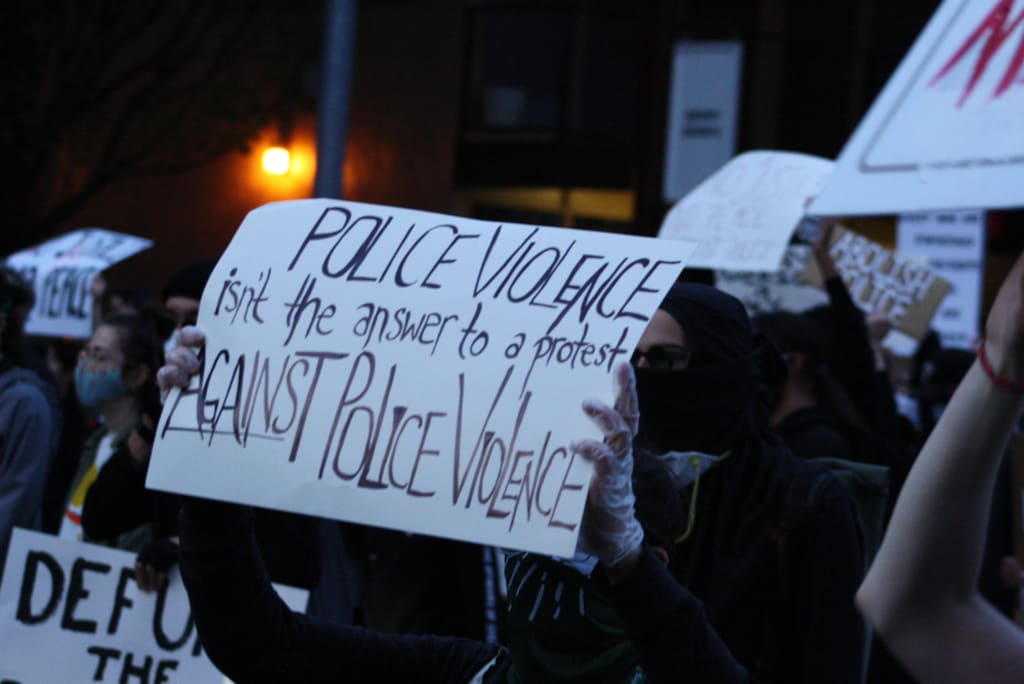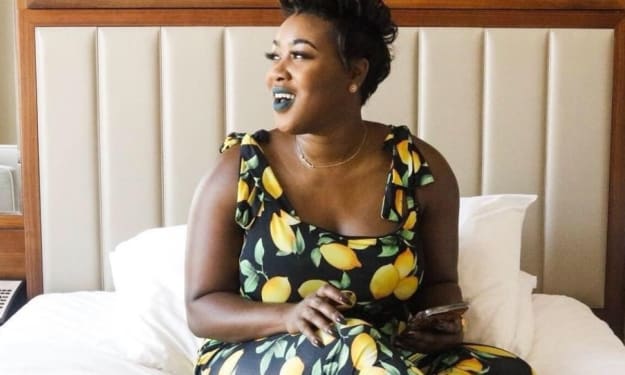On TV: Why I Don't Watch Police Procedurals
How onscreen depictions of the police are a potent form of propaganda.

In the real world, "To protect and serve" carries with it the unspoken addendum: "whites only."
A few years ago during a sunny, summer day in Arkansas, I was driving my mother to an appointment. As we were chatting about some innocuous topic, we saw flashing blue lights behind us.
"What on earth could be the problem?" My mother asked. I had no idea, but my heart suddenly felt too large for my chest.
I had not done anything wrong nor broken any traffic laws, but I'm a Black man and I know the inherent dangers police encounters hold for me because of the color of my skin.
My anxiety was exacerbated by my concern over my mother being present. As I pulled over to the side of the road with my hands visible atop my steering wheel, it seemed as if time crawled to a stand still as the officer approached my vehicle with his hand on his weapon.
"What's the problem officer?" I asked as I kept my eyes looking forward while my mother sat beside me silenced by her worry that was palpable.
"We had a notice a car fitting the description of the one you are driving had been stolen." He said, wearing sunglasses distorting my reflection in its lenses. "Well, I own this vehicle, officer, and I have the documentation in my glove compartment to prove it." I replied, still looking straight ahead.
Then the officer noticed my mother sitting beside me. "Is this your mom?" He asked. "Yes, she is." Beat. "Oh, well I don't think you would steal a car with your mother accompanying you. So you can be on your way."
He then casually strolled back to his patrol car, got in, and drove off - as I looked on furious by the distress he nonchalantly caused. I knew I had done nothing wrong, but because I was a Black man driving a car he claimed resembled a stolen one, I was automatically suspect.
Oh yeah, the officer turned down my offer to show him my vehicle registration and title documents before he walked away from my car.
If my mother had not been with me, this encounter may have turned out much differently - with the most dire consequences for me.
Most African Americans have had similar experiences with law enforcement: being pulled over because we are driving while Black and having the police called on us for no good damn reason while we attempt to just live our lives.
The Lie
With Breonna Taylor being killed by the police with her murderers escaping any accountability - the only officer indicted was charged for potentially endangering Ms. Taylor's neighbors and not for murdering her - this country's bloody and racist legacy of terrorizing its Black citizens via law enforcement rages on.
Due to this vile legacy, I can no longer stomach the jarring dissonance of watching Hollywood narratives portraying police officers as heroic figures.
For African Americans, these depictions are harsh fantasy, starkly at odds with cold reality. In the real world, "To protect and serve" carries with it the unspoken addendum: "whites only."
Hollywood is complicit in perpetuating the propaganda of a benevolent and altruistic system of law enforcement when in truth, it is a domestic terrorist organization targeting Black, brown, and poor people.
Police procedurals disseminate gross distortions of how law enforcement operates in the real world, ignoring its egregious racism and corruption.
Police onscreen are glorified for being corrupt, breaking laws, and behaving recklessly
In the alternate reality created by cop narratives, the police constantly skirt laws and regulations governing their conduct - or flagrantly break them outright. Such rogue behavior is lauded because, hey, they are solving crimes and catching "the bad guys."
Popular cop dramas such as NYPD Blue, The Shield, The Wire, Homicide: Life On The Street, Chicago P.D., Blue Bloods, etc., are praised for being gritty and riveting due in large part to their depictions of police officers behaving badly: physically assaulting suspects, planting evidence, lying on the witness stand, breaking and entering without a warrant, coercing confessions, and engaging in all sorts of unethical and illegal antics because they are, at their core, flawed heroes intent on meting out justice.
Americans have long been indoctrinated by these onscreen distortions because police procedurals have been a ubiquitous part of our media diet for decades.
But in reality, Black Americans has always been the prime target of police harassment, brutality, and abuse of power. While we may watch the hundredth iteration of Law & Order and patronize the latest buddy-cop comedy film, the truth is the police are insidious agents of oppression and domestic terror in Black communities - as per their original purpose.
Of course, these narratives are perfectly acceptable if you are a white American, because they closely reflect your reality.
Law enforcement was always designed to uphold and reinforce white supremacy — and white America knows it.
That is the real reason the police were being called on innocent Black people minding their own business. That is why Amy Cooper felt so confident in weaponizing her whiteness by threatening to call the police on Christian Cooper ( a Black bird-watcher). She knew full well it could have placed his life in dire jeopardy.
Breonna Taylor, George Floyd, Sandra Bland, Eric Garner, Tamir Rice, and countless other innocent African Americans murdered by police officers absolved from their crimes by systemic racism are a vehement refutation of the heroic fantasies spun by police procedurals.
A former veteran cop known only as Officer A. Cab wrote in hismust-read, scathing indictment of law enforcement:
Police officers do not protect and serve people, they protect and serve the status quo, “polite society”, and private property. Using the incremental mechanisms of the status quo will never reform the police because the status quo relies on police violence to exist. Capitalism requires a permanent underclass to exploit for cheap labor and it requires the cops to bring that underclass to heel.
I will give you three guesses as to what segment of the United States population mainly comprises the"permanent underclass" Officer A. Cab is referring to.
A Challenge
Unless Hollywood begins producing cop narratives exploring the harsh realities of the (over) policing of poor, Black and brown communities in this country, I will no longer watch them.
I will no longer support the spreading of lies which only serve to obfuscate the harm and exploitation policing in this country inflicts on its poor, Black and Brown citizens.
If you are reading this and are a Hollywood studio head, producer, or actor, you know your depictions of characters and institutions present in the real world have real-world impact. It is long past time the entertainment business re-examine its misguided allegiance to the unrealistic portrayals of law enforcement.
Like the rest of us, you have witnessed the same injustices and social unrest play out on the streets of this country.
You have the power and capability to reassess your messaging. I challenge you to commit to using the considerable influence of the media to shine the light of truth on the critical issue of police corruption and brutality.
Stop being a tool of state propaganda and start using the power of art to not only entertain, but also to inform and enlighten.
It’s long past time for police procedurals to accomplish something truly revolutionary: tell the truth.
Until then, I’m out.
A form of this article originally appeared on Medium.
About the Creator
Rod Faulkner
Rod Faulkner is a blerd, writer, and the founder of The7thMatrix.com, a website dedicated to promoting the best in indie SFF short films and web series. He can be found on Twitter at @The7thMatrix.






Comments
There are no comments for this story
Be the first to respond and start the conversation.